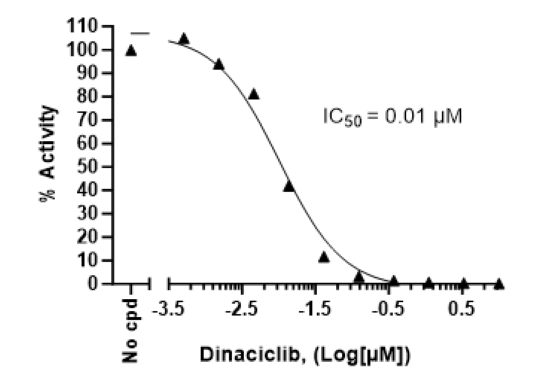Chemi-Verse™ CDK5/p35 Kinase Assay Kit
The Chemi-Verse™ CDK5/p35 Kinase Assay Kit is designed to measure CDK5 (cyclin dependent kinase 5)/p35 kinase activity for screening and profiling applications using ADP-Glo™ as a detection reagent. The assay kit comes in a convenient 96-well format, with enough purified recombinant CDK5/p35 complex, substrate, ATP, and kinase assay buffer for 100 enzyme reactions.
- ADP-Glo™ Kinase Assay (Promega #V6930)
- DTT (Dithiothreitol), 1M, optional
- Microplate reader capable of reading luminescence
- Adjustable micropipettor and sterile tips
- 30°C incubator
CDK5 (cyclin dependent kinase 5) is a serine/threonine protein kinase of the CDK family of proteins. It is expressed mainly in the brain, where it is linked to neuronal development and differentiation. CDK5 is an unconventional CDK protein, as its partner are the non-cyclin proteins p35 (early 35 kDa protein) and p39. P35 and p39 are myristoylated and recruit CDK5 to the cell membrane. Recent findings identified new roles for CDK5 in the nervous system, such as participating in neurite outgrowth, synaptic plasticity and homeostasis and circadian rhythm. Accumulation of p25, a fragment of p35, in neurons creates dysregulation of CDK5 function, and can result in Alzheimer’s disease (AD), Parkinson’s disease (PD), ALS (amyothropic lateral sclerosis) and Huntington’s disease (HD). CDK5 also participates in T cell activation, and overexpression of this protein has been found in cancer samples. It acts on increasing brain tumor stem cell numbers and can lead to upregulation of PD-L1 (programmed death ligand-1) and increase cancer cell immune evasion. Inhibition of CDK5 via small molecules and peptides is a promising area of research that can benefit cancer with neurodegenerative disorders and cancer.
Pao P.0C. and Tsai L.-H., 2021 Journal of Biomedical Medicine 28:79


